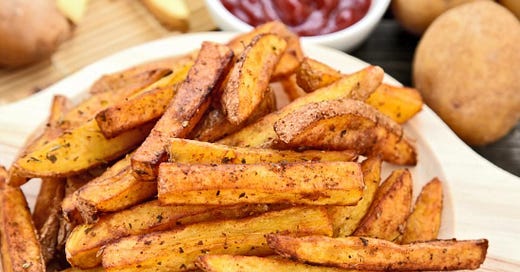In the English language, there are a few words starting with "French", like French fries, French toast, French kiss, French door, etc.
It’s quite amazing but none of these words or expressions actually exist in French. So what gives?
Let's review some of these words, with their translation in French.
French Fries: “Frites”
In France, people say "Frites" ( short from "Pommes Frites") which means "fried ". The origin of the name French fries isn't clear. For most historians these fries originated not from France but Belgium. Even the French are not fighting it. Belgian fries are good, very good.
If you go to Belgium one day, dont miss the local specialty: steak tartare and fries. Out of this world!
So why the name?
During WW1, American soldiers stationed in Belgium shared fries with their Belgian counterparts, who spoke French. Hence the name.
Another explanation is that the name comes from the English verb "to french" which means "to cut into long, thin slices before cooking".
This one seems to make more sense.
French Toast: "Pain Perdu"
Known as "Pain Perdu" in French, or "Lost Bread".
The purpose of the recipe (which goes back to the 15th century) was to accommodate stale bread. Bread was a valuable food and had to be preserve at all costs.
"Pain Perdu" later became more sophisticated, and a gourmet dish served at breakfast most of the time.
There are many explanations for the origin of the name French toast. One suggests it was named after Joseph French, an American who supposedly created it, but mistakenly called it "French toast" instead of "French's toast”.
However, the most likely reason for the name is that calling it “French” sounded fancier and allowed chefs to charge more for the dish.
French Door: "Porte-Fenêtre"
The French call it a "Porte-Fenêtre". "Porte" means door and "Fenêtre" window.
French doors, also known as French windows, have long glass panels that typically open outward, separated by vertical frames. Depending on their size and placement, one can use them as both windows and doors.
The concept was imported from Italy in the 15th century and perfected in France in the 16th and 17th centuries.
This was a great fit for lifestyles of that time, since electricity didn’t exist. Even on the dimmest days, the doors would allow for much needed natural light to enter the room.
Note that the French word "Fenêtre" comes from the latin "Fenestra" that also gave us the words defenestrate and defenestration in English.
Also, the accent on the “e” of "Fenêtre", called circumflex accent (the little hat), replaces the loss of the “s” present in the latin word and older French.
French Press: "Cafetière à piston"
Known as "cafetière à piston", this type of coffee maker is not very common in France. It seems to be more popular in Italy…
Nonetheless, the first press pattent is credited to two French designers, Mayer and Delforge, in the 1850s.
In France, people use either an expresso machine, an Italian press (how ironic!), or a classic dripper to make their coffee.
French Kiss: “?”
Last but not least, the famous kiss that sets the French apart in the realm of love and sensuality.
I won’t elaborate on the definition of a French kiss. We all know what it refers to, at least I hope…
It may come as a surprise, but there is no word for "French kiss" in French. In 2014, the French dictionary “Le Robert” introduced the name "Galocher" to define this particular kiss. This verb sounds horrible to French ears. It's so bad that nobody in France uses it.
So what word(s) do they use?
Well, they use the verb "embrasser" (to kiss) or the noun 'baiser" (a kiss), or some colloquial expressions dating back to the 20s, like “rouler un patin”. Not refined, but certainly much better than “Galocher”.
Why French Kiss?
It’s rather surprising but the expression “French Kiss” is not that old. It goes back to the 1920s.
American travelers likely coined the name after a romantic encounter with French women.
But it's after WW2, with the return of American soldiers from Europe, that the French kiss won its spurs on the other side of the pond.
However, according in a study published in 2015, only 46% of the population is into French kissing. Europe and Asia are leading with close to 75%.
If you know some other “French things” you’d like to discuss, make sure to add them in the comment section. Thanks!
Latest releases:
The Chateau d'If: the French Alcatraz!
The Extravagant Palace of Postman Cheval




